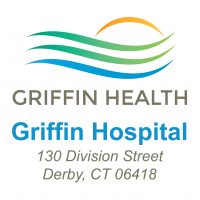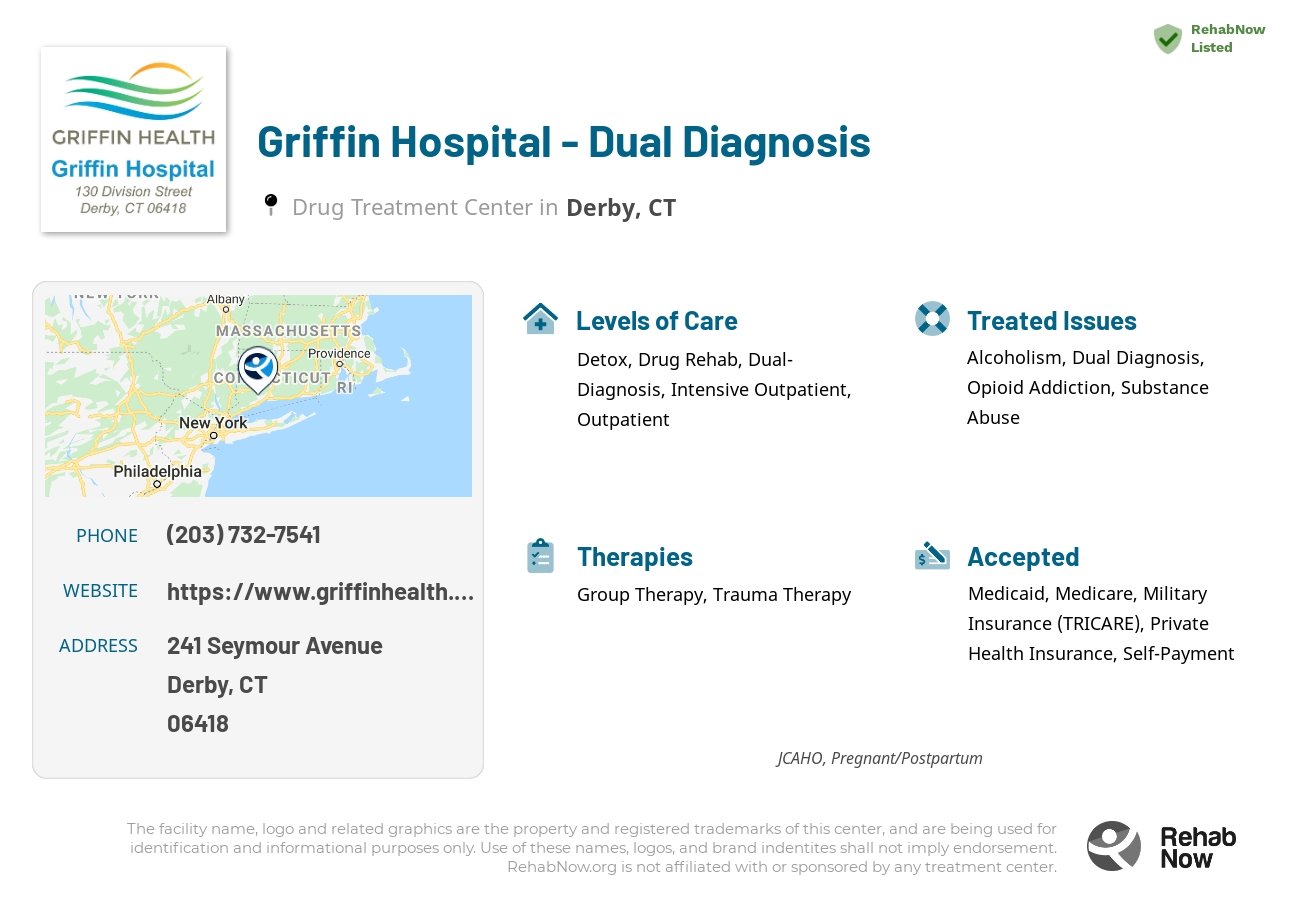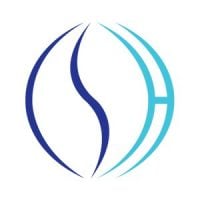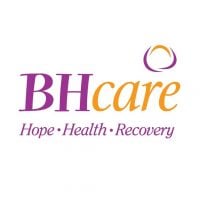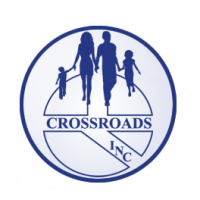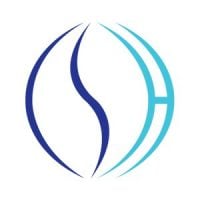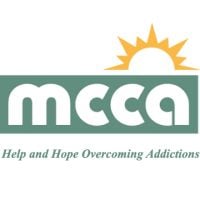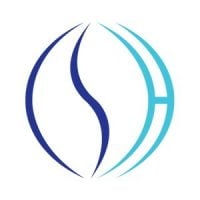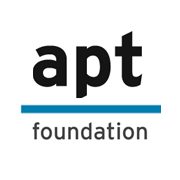Griffin Hospital - Dual Diagnosis
Drug Rehab Center in Derby, Connecticut
Griffin Hospital's Dual Diagnosis Addiction Treatment Facility in Derby, CT provides a comprehensive array of levels of care to help those struggling with substance abuse through evidence-based therapy sessions and a multidisciplinary team approach.
About Griffin Hospital - Dual Diagnosis in Connecticut
Griffin Hospital - Dual Diagnosis in Derby, Connecticut is a premier provider of treatment and services for those who are struggling with addiction and a mental health disorder. Their team of professionals is dedicated to providing a full range of care and support to their patients in a safe, supportive, and compassionate environment. Griffin Hospital - Dual Diagnosis works to understand their clients, providing individualized treatment plans that combine a variety of evidence-based practices and approaches. They offer a variety of therapies like group and individual therapy, medicinal therapy, holistic care, and recovery coaching.
At Griffin Hospital - Dual Diagnosis, they recognize the importance of understanding the unique challenges and conditions that people with addiction and mental health disorders face. The staff is specially trained in working with individuals suffering from substance abuse, trauma, and various mental health disorders. They provide a comprehensive, personalized approach to treatment that may include relapse prevention, family counseling, and support for co-occurring disorders. Additionally, their team of qualified professionals provides support in formulating healthy lifestyle habits and skills to maintain recovery.
Griffin Hospital - Dual Diagnosis is accredited by The Joint Commission, has been licensed by the State of Connecticut, and is a proud recipient of the Commission on Accreditation of Rehabilitation Facilities (CARF) accreditation. They also offer specialized programs such as the No More Distractions Program and Fresh Start, which are designed to equip individuals with the tools and resources necessary for successful recovery and reintegration into society. Additionally, Griffin Hospital - Dual Diagnosis offers a variety of holistic therapies to help individuals reclaim their physical and emotional wellbeing, such as yoga, music therapy, and art therapy.
Genders
Ages
Modality
Additional
Accreditations

JCAHO
Conditions and Issues Treated
A combination of treatments is often needed to treat drug abuse. Some addictions can be treated with counseling and support groups. In other cases, drug abuse can lead to a medical problem and require medical treatment. Treatment for drug addiction typically combines counseling and psychotherapy with medication and behavioral therapies.
A combination of treatments is often needed to treat drug abuse issues effectively. In the case of drug abuse, there is no easy answer or one-size-fits-all cure.
Opioid addiction has become a significant health problem in the United States. In 2015, there were 91 opioid overdose-related deaths per day, with a substantial increase in mortality rate in 2014.
When opioid addiction has reached a point where a person’s life becomes unmanageable, treatment options are available to help them get sober. Treatment that includes medical care with medications and counseling can help a user transition into sobriety.
When someone in struggles with both addiction and mental or emotional illness, this is considered a dual diagnosis. Dual diagnosis treatment can include therapy for these issues to happen simultaneously, which will allow either of them to be treated effectively.
Sometimes people who have suffered from addiction disorder also suffer from co-occurring disorders such as depression, anxiety, bipolar disorder, etc., making them “dual diagnoses.” Dual diagnoses require specialized treatment programs where drug and alcohol addiction are addressed along with psychiatric illnesses. Some rehabilitation facilities provide patients suffering from cooccurrences a program with highly integrated services and a clean environment with few distractions to help them succeed.
Levels of Care Offered
This center offers a variety of custom treatment tailored to individual recovery. Currently available are Detox, Drug Rehab, Dual-Diagnosis, Inpatient, Intensive Outpatient, Outpatient, with additional therapies available as listed below.
One of the first things an addict should do when entering treatment is to abstain from using illicit drugs completely. Depending on the length of time that the person has been using, the addict may have to go through alcohol or drug withdrawal. Fortunately, detox doesn’t have to be done alone, and withdrawal symptoms can be managed medically in an inpatient or outpatient setting. While detox may be uncomfortable, it is not life-threatening. Detoxification allows the addict to rid the body of all traces of drugs or alcohol and gives the addict a clean slate for their recovery.
Inpatient treatment for alcoholism or drug addiction is an option that provides the addict with a supportive environment in which they can stop using. After detox, an inpatient treatment center provides a structured environment for the addict to recover from their addiction and begin taking steps toward a lifetime of sobriety.
This type of treatment is appropriate for addicts that are most in need of intensive care and supervision. This includes those who were unable to quit on their own, those who need more structure than they can get in outpatient treatment, and those whose addiction has led them into legal trouble or severe health problems.
The Intensive Outpatient Program offered by Griffin Hospital - Dual Diagnosis is designed for those who need intensive care but would rather get it in the comfort of their own home. The treatment programs vary in duration and intensity and can be tailored to suit the patient’s needs. The program includes regular visits to the facility, though the overnight stay is not needed. IOP is suitable for patients who have been treated in residential treatment programs and are in the transition phase. It helps the patient live at home and discharge some work or school responsibilities even while undergoing treatment. The patients gradually get back to their routine life with the support of a friend or family member.
Outpatient treatment is often used for drug addicts in drug rehab. Outpatient treatment consists of counseling and therapy sessions. This form of treatment is also called ‘day-treatment’. The outpatient treatment process begins with the addict’s initial detox period, lasting about ten days.
Outpatient treatment is used for those who are at moderate risk for ‘slipping back’ into the addiction, for those who:
- Are not currently experiencing any side effects from withdrawal and can handle social pressure
- Can handle stressors that might trigger relapse
- Have a stable living environment or have moved out of their previous environment, which was not conducive to being sober
- Have a support system that allows them to go to a facility a few times a week while still keeping their current responsibilities
- Have no legal obligations, being either on parole or probation, that require them to seek treatment at a mandatory facility
- Are not currently experiencing any side effects from withdrawal and can handle social pressure
- Have a stable living environment or have moved out of their previous environment, which was not conducive to being sober
Therapies & Programs
Because no single treatment is effective for all addicts, the goal of treatment and therapy should be to figure out what works best for each individual. Tolerance and withdrawal levels differ from person to person, affecting the treatment intensity required. Addiction treatment should aim to help addicts develop healthy coping mechanisms for dealing with their addiction and its underlying causes.
Group therapy can help build a stronger support system and give addicts in Derby, CT insight into their addiction that they gain through shared conversations. Group therapy occurs in a controlled group environment, exclusive of one on one meetings. This makes it safer for patients to feel comfortable sharing the struggles they’re going through and gaining perspective.
Trauma therapy is beneficial for people who are recovering from drug addiction because it helps them heal from past traumas that may have caused them to turn to harmful substances or led them to experience negative emotions that contributed to their destructive behaviors.
This type of treatment works by processing difficult experiences so individuals can learn how to process these events without having to turn to substances for coping.
Trauma therapy can help addicts in the following ways:
- Helps individuals understand their experiences and emotional responses to difficult events, including why they turned to drugs or alcohol
- Provides them with comfort and support while working through difficult emotions related to these traumatic experiences
- Offers an opportunity for addicts to have a voice and be heard, which can improve their self-esteem
- Can help them develop coping skills so they can better respond to triggers instead of turning to substance abuse.
Payment Options Accepted
For specific insurance or payment methods please contact us.
Is your insurance accepted?
Ask an expert, call (888) 674-0062
Griffin Health Services Corporation Associated Centers
Discover treatment facilities under the same provider.
Learn More About Griffin Health Services Corporation Centers
Additional Details
Specifics, location, and helpful extra information.
Derby, Connecticut 6418 Phone Number(203) 732-7541 Meta DetailsUpdated November 25, 2023
Staff Verified
Griffin Hospital - Dual Diagnosis Patient Reviews
There are no reviews yet. Be the first one to write one.
Derby, Connecticut Addiction Information
Connecticut has a higher rate of substance abuse and addiction than the national average. The state ranks in the top 10 in the country for illicit drug dependence among those ages 18 to 25. In 2010, there were 9,211 people admitted to an alcohol treatment facility for alcohol abuse combined with a secondary drug. Connecticut ranked fifth in the United States of America for the number of fatalities involving drunk driving in 2014.
The number of people addicted to drugs in Derby is estimated at around 9%. Heroin is the most commonly abused drug in the city, with 1,521 overdose deaths in 2016. Opioid overdoses have become the leading cause of death in Derby. From 2012 to 2016, the number of opioid-related emergency department visits increased by 95%. After getting sober, life in Derby, Connecticut, can be challenging but ultimately rewarding.
Treatment in Nearby Cities
- Darien, CT (26.6 mi.)
- Middletown, CT (27.7 mi.)
- Vernon-Rockville, CT (46.1 mi.)
- Clinton, CT (29.3 mi.)
- Bristol, CT (24.4 mi.)
Centers near Griffin Hospital - Dual Diagnosis
The facility name, logo and brand are the property and registered trademarks of Griffin Hospital - Dual Diagnosis, and are being used for identification and informational purposes only. Use of these names, logos and brands shall not imply endorsement. RehabNow.org is not affiliated with or sponsored by Griffin Hospital - Dual Diagnosis.
